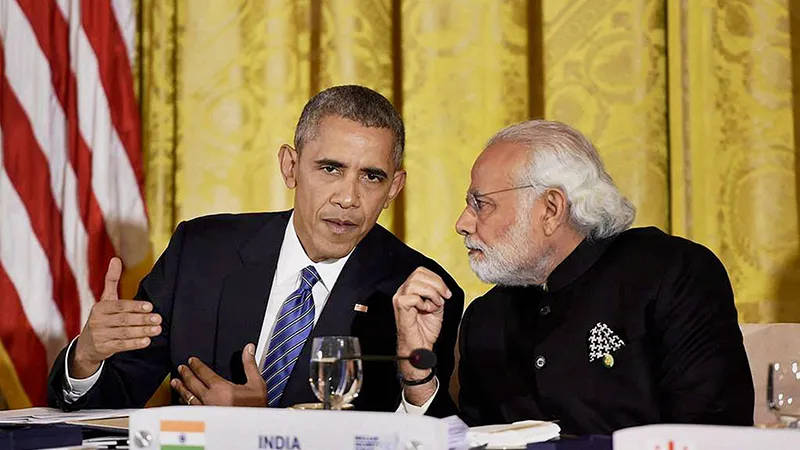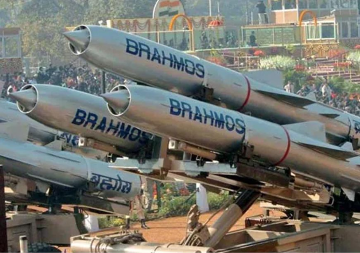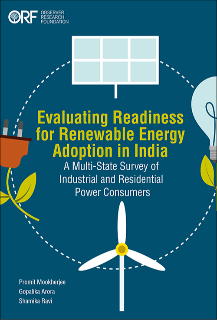It is indeed commendable that a man ostracised by the US until a couple of years ago is shortly going to address the US Congress and meet US President Barack Obama in a fourth bilateral.
This shows pragmatism on both sides as India-US relations continue on an upward trajectory.
There will be glitter and warmth when Narendra Modi arrives to meet his ‘friend’ Barack next month. Beneath this, there is a lot of hard work for the future to be straightened out.
Obama will be meeting Modi for the last time in his official capacity, but Modi would do well to remember that by January next year, there will be a hawk in Washington and another in Beijing who has been accumulating tremendous powers unto himself.
Both these hawks will remain in position throughout Modi’s current term of office and the China-US rivalry is bound to get strained. We would need to be careful.
The other concern is the vast gap between India and the US in every way: economic, military, technology, even in goals and perceptions, interests and means. Any agreement between the two will be uneven and tilted against India. Both sides will have to constantly work to remove wrinkles that will keep appearing.
India needs to think big and think through on many issues but must not forget to read the small print.
For instance, the Logistics Support Agreement (LSA), rechristened the Logistics Exchange Memorandum of Agreement (Lemoa), still has clauses that seem worrisome.
Hopefully, the implications of the clause that will allow the US using Indian bases and ports for its own military objectives has not been lost on India strategists.
As new constellations get organised, for an impending Asia-centric Cold War 2.0, there will be searches for new satellites too.
If India is to be the swing power against China, what if Russia, our old friend, becomes the swing power for China against US.
< style="color: #163449;">Hyphenation Error
The suggestion by some that India should join in with the US for the next technology frontier, artificial intelligence, sounds good. But the mismatch between the countries’ attainments is so huge that we will be left piggybacking.
A partnership on this will be so uneven that it will lead to mutual resentment. Our own R&D effort is so abysmally low that despite fancying ourselves as the IT nation, there is little to show for this.
Besides, India’s needs are not just more robotics, but to make its millions of unemployed youth employable.
The US may have begun to abandon hyphenating India and Pakistan. But it cannot help being ambivalent about Pakistan. This will not change, however much we find US policy on Pakistan inexplicable.
China, on the other hand, insists on hyphenation between India and Pakistan. What India has, Pakistan must have, is the simple principle.
China has revised its stance on Pakistan and goes beyond the usual ‘Higher than the mountains’ rhetoric.
Today, the Chinese assert Pakistan is their closest ally in Asia and they will stand by Pakistan. This is a message both to India and the US.
In recent years, the US has been extremely expansive in many ways when dealing with India. There must be some very good reasons for this warmth. Democratic values of India?
This sounds good, but the US has not really been too concerned about this virtue in its international transactions. Consider also that over decades, we got no brownie points for striving to remain a democracy.
Partners? But a partnership is between equals and an India-US partnership is badly skewed. Even our annual trade has declined. Or India as a market and the West’s catspaw as a counterbalance against China.
The US is the mightiest military power in the world. Never in history has a country spent so much on armament and defence every year and divided the world into its own military commands with bases strewn all over. Yet, its ability to exert influence has not been commensurate with this military power.
The stalemate in Asia soon after the end of World War 2 was followed by a defeat in Vietnam, an illusory victory in Afghanistan whose horrible after-effects continue till today, and interventions in Iraq-Syria have been disasters. Writers like Michael Pillsbury worry that China could become a nightmare for the West and assert that Beijing has long-term well-laid out plans to be the supreme power in the world.
< style="color: #163449;">Headline Interest
Our main interest should be economic, and technology with a limited military interest to make us strong enough in the Indian Ocean Region and self-reliant in defence.
It is not that we should aim to confront China in every sphere, but that we should be able to stand up on our own. We cannot afford to have seemingly inconsistent policies with regard to China.
The recent hasty backtracking on the issue of a visa to Uighur leader Dolkun Isa did not do our image in the neighbourhood any good.
India and the US may not become allies or partners. The former requires a near total commonality of interests and ethos while the latter presumes equality. None of these possibilities exists in US-India bilateral ties.
What we should, therefore, reasonably seek is a long-term understanding, or an arrangement that endures.
This commentary originally appeared in The Economic Times.
The views expressed above belong to the author(s). ORF research and analyses now available on Telegram! Click here to access our curated content — blogs, longforms and interviews.




 PREV
PREV



